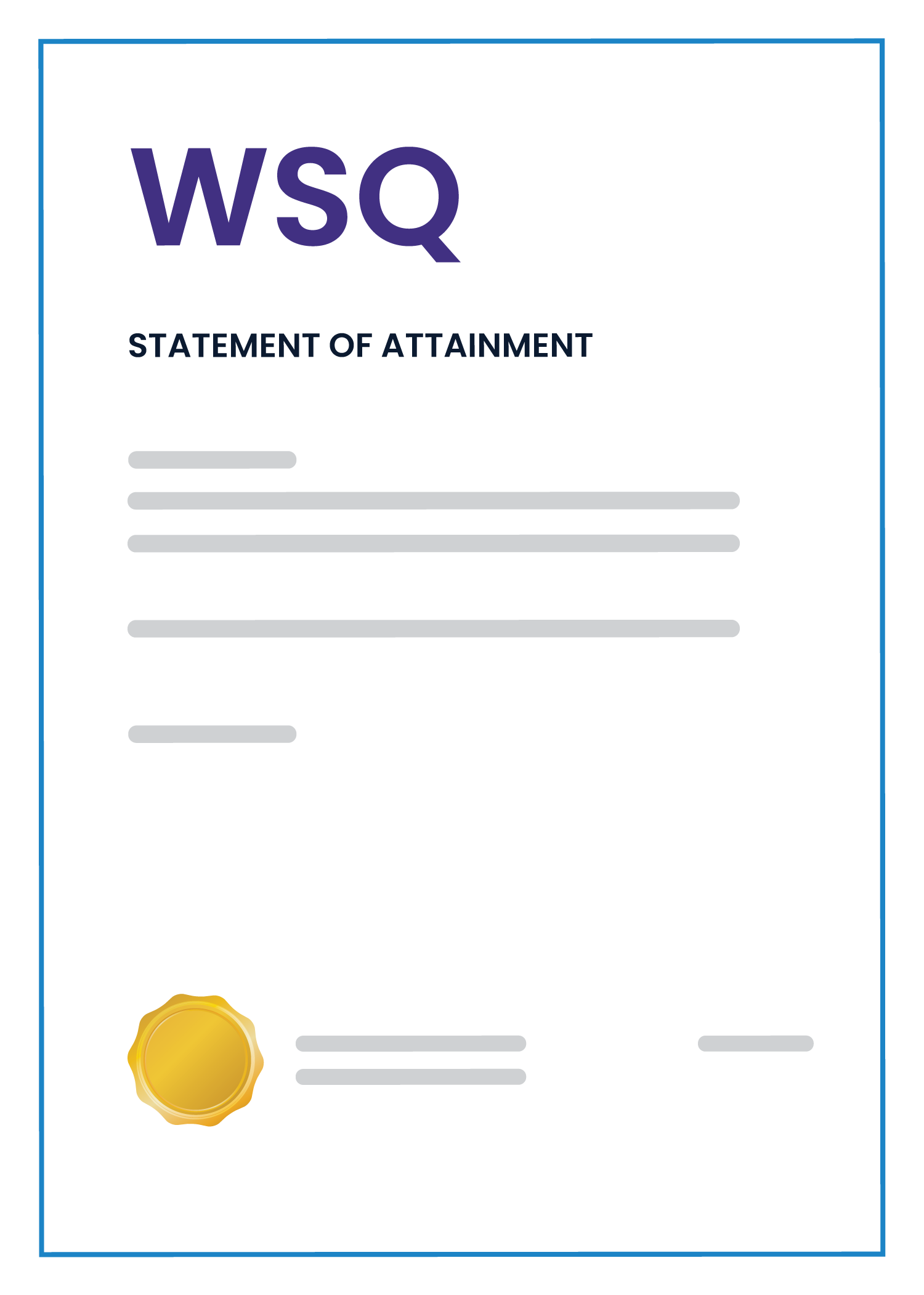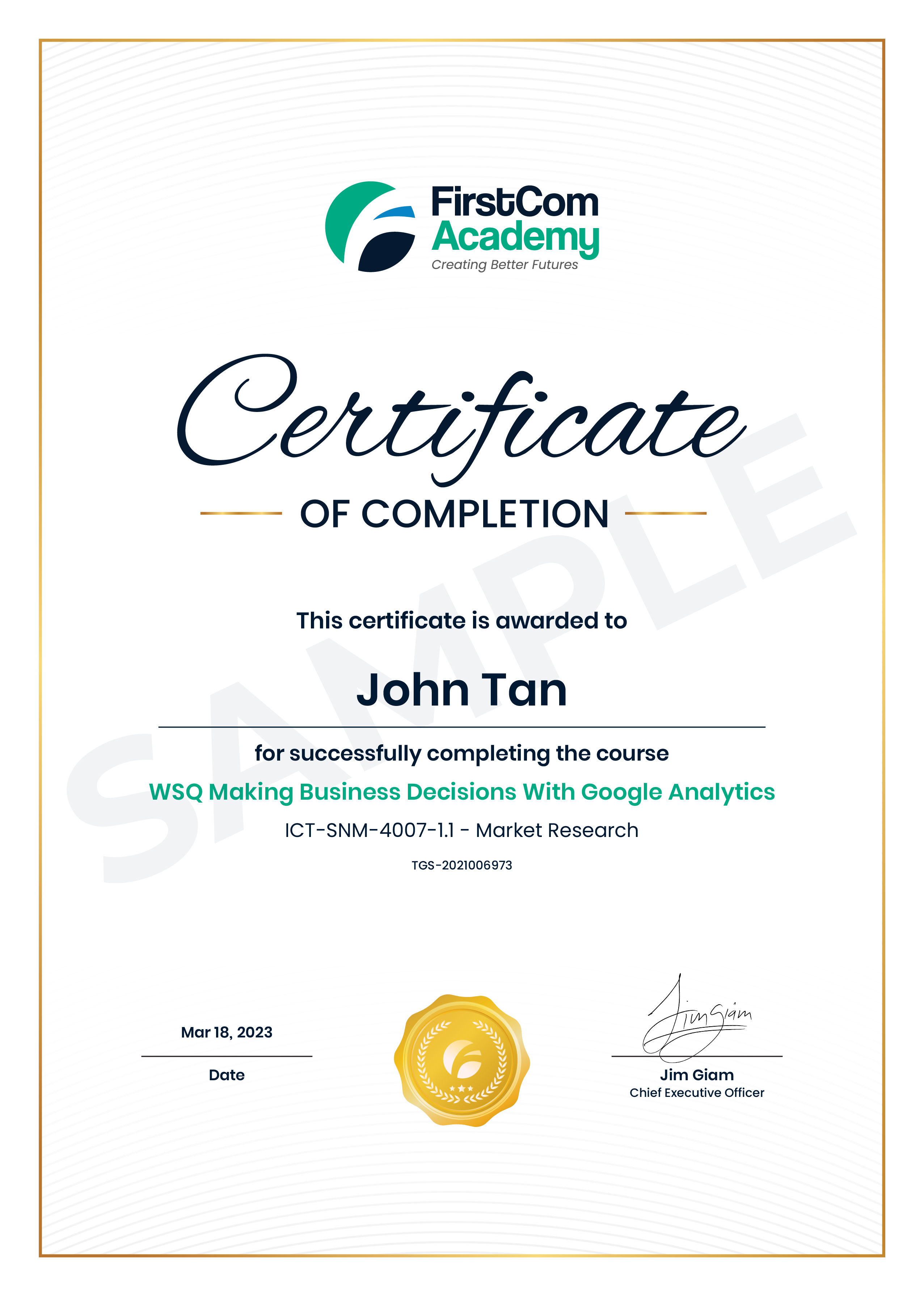Course Overview
With millions of users visiting websites on a daily basis, data is the pivotal asset for advertising success and discerning what truly resonates with your website visitors.
This comprehensive 2-day course is designed to equip you with the essential knowledge and practical skills to leverage Google Analytics for making data-driven business decisions. A significant portion of the course is dedicated to Google Analytics, covering its functionalities, best practices, and the legal and business implications of data collection, including Singapore's PDPA and Europe's GDPR. You'll learn to set up and optimise Google Analytics, determine parameters for data collection, and improve your customer data collection strategies. By the end of the course, you'll also be able to interpret Google Analytics reports, conduct competitive benchmarking, and draw valuable business insights from your data to optimise digital marketing campaigns.
This comprehensive 2-day course is designed to equip you with the essential knowledge and practical skills to leverage Google Analytics for making data-driven business decisions. A significant portion of the course is dedicated to Google Analytics, covering its functionalities, best practices, and the legal and business implications of data collection, including Singapore's PDPA and Europe's GDPR. You'll learn to set up and optimise Google Analytics, determine parameters for data collection, and improve your customer data collection strategies. By the end of the course, you'll also be able to interpret Google Analytics reports, conduct competitive benchmarking, and draw valuable business insights from your data to optimise digital marketing campaigns.
Platforms & Tools Introduced


Course Highlights
- Introduction to Google Analytics, which is a free web analytics service provided by Google for tracking website performance and collecting visitor insights to allow data-driven business decisions.
- Follow a guided process to set up your Google Analytics account and learn recommended best practices for Google Analytics such as the optimal data retention duration, installing internal traffic filters, and setting custom events and dimensions.
- Understand Singapore's Personal Data Protection Act (PDPA) governing the collection, use, and disclosure of personal data, including the rights of individuals and obligations of organizations, as well as General Data Protection Regulation (GDPR), the European legislation protecting personal data in the EU, its applicability, and the concept of cookie consent.
- Understand Google Tag Manager (GTM) as a free tool to manage and deploy marketing tags without modifying website code, and its core components: tags, triggers, and variables.
- Focus on essential metrics like Users, Sessions, Average Engagement Time, Percentage of New Sessions, Pages per session, Conversions, Total Views, View by Page, Lifetime Value, and Lead Generation Cost (CPV).
- Learn practical ways to optimise your website using GA insights, such as watching engagement rates, identifying best content, making mobile-first decisions, studying behavior flow, and optimising pages for conversions.
- Utilise various Google Analytics reports like Real-time, Life Cycle (Acquisition, Engagement, Monetization, Retention), and User Reports (Demographics, Tech) to draw business insights and optimise marketing campaigns.
- Understand the implications and benefits of Google Analytics for making crucial business decisions, gathering information about visitors, tracking popular pages, evaluating traffic flow, monitoring website engagement, and tracking mobile visitors.
Learning Outcomes
By the end of this course, you'll be able to:
- Comprehend different types of data from Google Analytics (dimensions and metrics).
- Draw actionable insights from Google Analytics reports to make strategic business decisions.
- Analyse insights of visitor behaviour and optimise digital marketing campaigns for goal conversions.
Competency Assessment
Case Study & Practical Assessments
Stand Out From The Competition With Professional Certificates
Candidates who complete each module with at least 75% attendance and demonstrate competency during assessment will receive a Certificate of Completion by FirstCom Academy and a WSQ Statement of Attainment.


Entry Requirements:
- Aged 21 and above
- Have basic computer literacy Level 2
- Have minimum GCE “N”, “O” or “A” Level / NITEC or a diploma qualification and minimum 2 years of working experience; and
- Have an English language proficiency equivalent of higher of any of the following – GCSE N/O Levels pass in English / WPLN Level 5 / IELTS 5.5 / TOEFL (internet based total) 46-59
Enquire About Our Courses
Ready to Upskill? We’re here to Support You.
Making Business Decisions with Google Analytics
TGS-2021006973
The course fee will be automatically subsidized during the online enrollment process.
View Full Pricing

Mode of training:
Classroom

Duration:
2.5 Days

Course Accreditation:
WSQ
Loading...
!
 Select Date
Select Date
- Available
- Selling Fast
- Full Enrollment
Please select a course date
Your training location is at
Course Timing for
Course Fees & Subsidies
| SMEs | |
| Course Fees | |
| 70% SkillsFuture (SSG) Subsidy | |
| Nett Fee | |
| Non SMEs | |
| Course Fees | |
| 50% SkillsFuture (SSG) Subsidy | |
| Nett Fee | |
| Additional Support | ||||
|
Additional Support via Absentee Payroll |
||||
|
||||
|
Up to 90% Additional Subsidy from SkillsFuture Enterprise Credit (SFEC) |
||||
- Nett Fee is subject to 9% GST charged based on the full course fees before subsidy.
- Absentee payroll is claimable up to $4.50 per hour, capped at $100,000 per enterprise per calendar year.
- Subjected to individual company’s budget availability for the Enterprise Innovation Scheme. Each company can only either the 400% Tax Deduction option OR the 20% Cash Payout option. For more information, please refer to https://www.iras.gov.sg/schemes/disbursement-schemes/enterprise-innovation-scheme-(eis)
- Subjected to individual company’s budget availability for SFEC. For more information, please refer to https://www.enterprisejobskills.gov.sg/content/upgrade-skills/sfec.html
SME Eligibility Criteria
- Registered or incorporated in Singapore
- Employment size of not more than 200 (at group level) or with annual sales turnover (at group level) of not more than $100 million
| Singapore Citizens (40 years and above) | |
| Course Fees (Before GST) | |
| 9% GST | |
| 70% SkillsFuture (SSG) Subsidy | |
| Nett Fee | |
| Singapore Citizens (21-39 years old) & PR | |
| Course Fees (Before GST) | |
| 9% GST | |
| 50% SkillsFuture (SSG) Subsidy | |
| Nett Fee | |
| Additional Support | |
|
SkillsFuture Credits eligible for Singapore citizens aged 25 & above |
|
|
PSEA eligible for Singapore citizens aged below 30 |
|
|
NTUC UTAP members can have up to 50% reimbursement on out-of-pocket cost |
|
- Nett Fee are inclusive of GST charged based on the full course fees.
- Subjected to individual’s eligibility and availability of SkillsFuture Credit.
- NTUC UTAP reimbursement is capped at $250 for members aged below 40 or $500 for members aged 40 & above.

